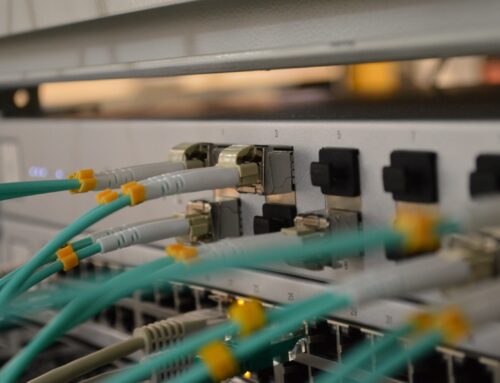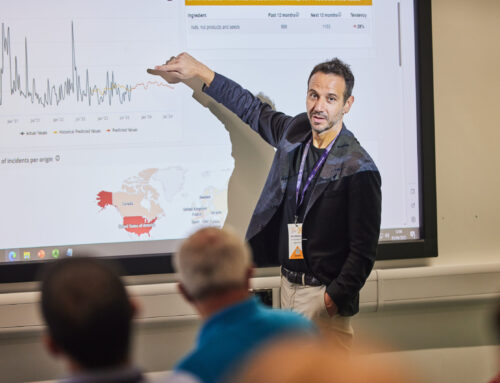During the lockdown measures, thousands of food safety & quality professionals have been mostly working from home. This remote mission has been made possible by numerous great software platforms and tools, using a plethora of innovative technologies. All this time, I have been discussing with colleagues from other companies about the way that they experience this digital transformation of food safety and quality. What I hear is extremely interesting, therefore I have decided to ask some of them to share their views through this blog.
My first interview is with one of the very intelligent people that I’ve met in the sector. He has an extremely deep understanding of knowledge resources, information services and data platforms that can support safety, quality and compliance professionals in the food supply chain. He is also Dutch – which means that he is very direct and honest in anything he says 🙂
Dr. Ruud Overbeek is currently a Member of the Executive Leadership Team of FoodChain ID, holding the position of SVP. Furthermore, he is a Non-Executive Board Member at Edloomio, a digital learning provider, and CSO at Decernis. Before joining Decernis, Ruud held leadership positions at Intertek as Global VP, at Avantium as VP, and at ABB as Technology Development Manager.
Ruud achieved the DuPont Chemical Company Prize for Outstanding Independent Research four times and holds a Doctorate in Catalysis and an MSc in Chemistry from Utrecht University, The Netherlands. He is an inventor on over 20 patents and an author of many scientific and industry papers.

I opened the interview by pointing out that many people think that COVID-19 accelerates the digital transformation of the food supply chain, and asked his opinion about upcoming changes that he foresees.
Ruud, which changes do you see coming in the market?
There is no doubt in my mind that the current experience will catalyze a change in the way we, and therefore our customers, will work. Our workplace is no longer a physical space, an office, or a desk. Our “digital” workplace has developed rapidly, transforming the way we work dramatically over the last decade, and especially in the past two months. As an example, cloud-based infrastructure services spending hit record growth in Q1 2020, increasing 34% according to recent research.
This growth was driven by organizations around the world moving to remote work as the COVID-19 pandemic hit, and enterprises sought rapid access to such resources. The above developments imply a shift in the way organizations are doing business, and business models that are customer-faced will continue to invest in cloud-based technologies, as they did over past years.
But before COVID-19, we already noticed rapid changes across the industry and in our daily lives: people no longer purchase CD’s or rent DVD’s, they stream music and movies from providers. We noted an increase in web-based meetings and webinars, even before the pandemic. Businesses also increased customer acquisition online.
The world has been shifting to digital, and we expect it to shift even faster. Despite this growth, companies are showing some caution in investments as they wait for the economic impact of COVID-19. Focus has been on supporting key parts of operations through proven technology solutions.
What do you hear from your clients? Which needs are they highlighting during this period?
We focus on Food Retailers, Brands, and their Supply Chains, which span from ingredients and commodities used in food, to food and its packaging. The increased globalization of the food supply has put a strain on the food safety regulatory framework and, therefore, on our customers. This is exacerbated by COVID-19, which has caused substantial supply chain disruption.
The growing complexity of the supply chains has led to fundamental change, and customers have an increased need for compliance technology and expertise. There are several factors that influence this shift:
- Global supply chains are more difficult to monitor and control.
- Risks related to fraud, safety, and social or environmental supply chain practices.
- Regulatory asymmetry between countries creating a more complex market.
- Import from countries with weaker food safety practices into countries with more stringent practices, in turn increasing the risk of food safety incidents.
Though today’s technology produces a wealth of information, information alone is insufficient for firms to be successful, because:
- Paralysis through Analysis – the easy option is simply to request more information.
- Easy access to data makes us intellectually lazy – the bigger the dataset, the easier it is to find support for any hypothesis you choose to test.
- Impulsive and Flighty Consumers of Information – the capacity to focus and concentrate on a specific activity is falling.
- Learning can be dangerous – democratization of information creates an imbalance, with certain people incapable of interpreting and using information in a sensible way.
- Generation of information will only increase – there was more information generated in 2018 than in the entirety of human history, resulting in a substantial reduction of the value and life of knowledge.

How do you respond to these needs? What is your company doing differently to serve your clients better?
Despite the advance of technology, producing meaningful datasets is still difficult to accomplish. While we have access to more powerful data analysis tools, a lack of proper integration of these tools and processes leads to lesser ROI.
To adapt to this shifting landscape, the industry and customers-alike should:
- Embrace technology to use resources more effectively.
- Focus on retaining, and not replacing knowledge. Nothing is ever irrelevant!
- Increase transparency.
- Focus on usability of tools. Powerful tools are wasted if ineffectively used.
We are focused on providing increasingly integrated solutions and systems to deliver a holistic compliance and safety program, facilitating the development and ongoing requirements of customer compliance processes. We cover over 200 countries offering a comprehensive global approach to solving the challenges of this New Food Economy. We have developed proprietary databases of thousands of mapped products and ingredients and millions of multi-lingual terms.
This allows us to leverage knowledge to perform value-added, outsourced expert services and consulting. Our cloud‐based applications and enterprise solutions integrate with customers’ processes, collecting valuable data to help customers mitigate risk and ensure compliance at all stages of the food supply chain.
In your opinion, what is the digital technology that will be more extensively adopted by the market during the next 12 months?
We should be acutely aware that a new generation will be entering the workforce. Already they are the new consumers of our products, systems, and data. Gen-Z currently makes up no less than one-third of the Earth’s population and has a profound impact on how technology is used and developed.
My prediction for what is to come has been very much inspired by my Gen-Z kids; my son, Bjorn, who studies Computer Sciences and Artificial Intelligence more than 8000 kilometers from our home, and my daughter, Olivia, a rising senior.
I believe AI and machine learning will play an increasing role going forward. This rapidly developing technology already handles repetitive tasks allowing humans to focus on the most engaging parts of their jobs, allowing companies to leverage the workforce more effectively. As an example, AI-powered chatbots help my company with customer support, learning from real marketers, salespeople, and customer service reps, while answering questions accurately.
There should be no doubt that AI-powered technology will play such a role, not just for mundane tasks but also for transforming complex data into analytics. Because we will increasingly generate massive amounts of data, this data is useless without transforming it into valuable insights. AI will increasingly help companies make use of their data by consolidating it from a variety of sources, making it available in a central searchable source, allowing customers to identify important changes and patterns, and even predict key business metrics.
More evolved AI algorithms identify trends, segment data, uncover anomalies, and create detailed reports. AI makes connections within millions of seemingly extraneous signals that humans would never be able to analyze otherwise. With companies and governments spending billions on AI annually, with technology giants leading the way, and with AI becoming a more prominent part of the curriculum for leading Universities, disruptive breakthroughs are bound to happen.
More powerful AI that could read and understand everything humanity has ever written, will allow AI to increasingly take over tasks that were once thought to be exclusively human. It can only be imagined how this can be useful to all…
I will continue interviewing people working at digital solution providers. If you wish to be notified about new interviews as soon as they are published, just subscribe below.







